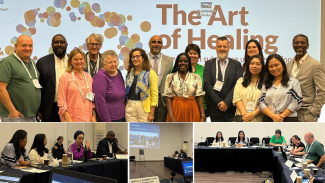Civil society’s role in substance use prevention, harm reduction, treatment, and recovery support highlighted at the 2024 ISSUP Conference

Thessaloniki (Greece) – 4 July 2024. Partnerships with civil society are essential for implementing joint drug policy commitments, tackling the world drug problem and helping to ensure health and wellbeing for all. By providing meaningful inputs to the Commission on Narcotic Drugs (CND), NGOs are ensuring that community voices are heard by Member States. Their deep-rooted knowledge and community connections enable effective advocacy, innovative approaches, and robust accountability mechanisms. Strong collaboration supports the implementation, monitoring, and evaluation of policies, fostering continuous improvement and better outcomes in global drug control efforts.
On the margins of the “Art of Healing” International Conference organized by the International Society of Substance Use Professionals (ISSUP) from 24 to 28th of June, the UNODC Civil Society Unit (UNODC CSU) together with the Vienna NGO Committee on Drugs (VNGOC) hosted a workshop on the role of civil society in accelerating the implementation of joint drug policy commitments. The biennial conference of the ISSUP gathered more than 500 experts, practitioners, policymakers, and civil society representatives working on drug demand reduction, enhancing civil society contributions to international drug policy commitments.
Mirella Dummar, Chief of the UNODC Civil Society Unit, and Matej Košir, Chair of the Vienna NGO Committee on Drugs highlighted the essential contribution of civil society in shaping and implementing global drug policies, emphasizing the importance of evidence-based services, community support, education, and advocacy in preventing drug abuse.The workshop provided an overview of the outcomes from the 2024 Commission on Narcotic Drugs (CND) mid-term review. It presented and discussed the main findings and recommendations from the global consultations and an online survey conducted in preparation for the mid-term review. Additionally, it sought to identify concrete actions that civil society can take at local, national, regional, and international levels to accelerate the implementation of joint drug policy commitments through 2029. Including through strengthening existing regional networks such as the African Civil Society Forum on Drugs and the VNGOC Ad-hoc working groups in Asia-Pacific and Latin America and the Caribbean. Participants also resolved to feature more success stories and more positive data showing the positive impact of evidence-based prevention, harm reduction treatment and recovery on communities. The workshop also aimed to foster dialogue and collaboration among civil society representatives from diverse regions, sectors, and perspectives on drug policy issues.
Discussions focused on opportunities for engagement in 2024, including at the CND thematic discussions, and how civil society efforts can meaningfully engage including through better featuring health-oriented approaches. Participants discussed how their day-to-day work relates to the challenges identified in the 2019 Ministerial Declaration and how NGOs can best share innovative approaches, challenges and solutions at relevant intergovernmental meetings.
The workshop also provided an opportunity to discuss the Oviedo Declaration and other regional consensus documents such as the African and Asia-Pacific Civil Society Common Positions and how they can be best leveraged in local and regional contexts in efforts to address drug abuse. Augusto Nogueira on behalf of the Oviedo Task Team, highlighted the Oviedo Declaration as a prime example of civil society's collaborative efforts to advance international commitments.
At the end of the workshop, opportunities for civil society engagement in the Summit of the Future were highlighted, including involvement through the “The Future of Drug Policy” ImPACT Coalition.
Further information: